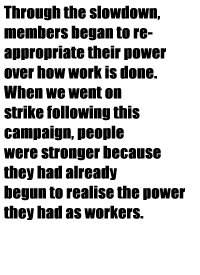
Mikael Antony Swayze
2. The feelings in the aftermath of 1999-2000 seem to be that the result was neither a victory nor a disaster, but a bit of both. Among the membership, some feel disappointment and defeat. Others feel rather neutral. Only a few feel victorious. There is the possibility of building for the next round (which there really wasn’t post-91). The membership will be more knowledgeable (though a little bit “burned”). The irony in all of this is that, although the objective real gains in this round of bargaining exceeded all previous rounds (including those of the two previous strikes), large numbers of people feel we sold out. On the one hand, it is true that we fell quite short of our original bargaining position. But the position we took was maximal. We demanded an 80% increase in expenditure. Furthermore, we took this position under the real threat of being busted. And we survived, taking no concessions and making large gains.
3. This strike was also unique for the Union in so far as we engaged in a month-long legal work slowdown prior to the full withdrawal of services. For a Union like ours, this was a novel approach to take and gained us a fair amount prior to the withdrawal of services. If nothing else it demonstrated the resolve of our membership to take action and it strengthened individual members’ resolve because they could actually take action. For the most part, labour law in general disempowers workers in an industrial society. When Unions are in legal strike/lockout positions, individual workers regain some of their power. In the case of U of T, members asked for and received support for a slowdown campaign. Through the slowdown, members began to reappropriate their power over how work is done. When we went on strike following this campaign, people were stronger because they had already begun to realise the power they had as workers.
4. There are three questions that need to be answered: What was gained/lost? Could we have gained more? Why do some members feel disappointed and defeated?
5. What was gained? Many things were gained by the Union in this round of bargaining up to and including the strike/lockout. We experienced what it is like to coordinate a strike for the “first” time. We’ve learned how to plan for and run a strike. We know now the problems involved logistically and practically. We also have a sense of how far the Employer will go in a confrontation with our Union. They actually tried to break the Union by threatening to fire us all. That is a first for the University of Toronto. The bitterness engendered by that threat will last a long time.
6. We also gained key ‘gatekeeper” provisions in the Collective Agreement that will facilitate the enforcement of the Agreement. It is hard to believe that it has taken a quarter century for the Union to get the right to all job postings! We also gained key language on workload, union security and progressive discipline. We have improved the job security for our PhD candidates and doubled their benefits under the dental rebate scheme. We broke the pattern in contract talks by getting close to 5% over 2 years and a 10-17% signing bonus for members this year. We took no concessions (they asked us for concessions but they were all rejected). Without a doubt these are the most significant gains that the Union has ever made at the UofT.
7. Could we have gained more? This is a hypothetical question. I think the best way to answer it is to say that given when we chose to begin our strike; given the issues on the table when the strike was called; and given the political atmosphere on campus and in the province, I think it unlikely that we could have got more. An earlier strike, in say October or early November, may have had a different outcome.
8. The problem with the timing of our strike was that it was both too late and too early. An earlier strike would have put into jeopardy the entire year at a time when it would have been too late to restructure the first-term courses. Had we struck later in the second term, it would have been too late to restructure the second-term courses. As it turned out, the Employer took advantage of a strike at the beginning of term to announce a restructuring of the second-term courses. It became quickly apparent that there might be no work for the bargaining to return to at the conclusion of the strike. This was a terrible potential outcome for the Union, the members and the Administration. There was also a possibility that such an outcome could be used by the Employer to foster a decertification drive--putting into peril the achievements of 25 years of struggle. A strike that did not fundamentally challenge the authority of the University as such (as our demand for tuition relief was perceived), might have had a different outcome. If other circumstances had not conspired to bring us back to the table when we went back, we might have gained more. But we have to remember that there is a limit to what a trade union can plan, not only because of external factors but because, as a trade union, many of the key decisions in large public meetings of the membership rather than in small committee.
9. Why do some members feel disappointed or defeated? Quite simply we fought a battle on principle and retreated from the battle-field having gained a truce but not the lofty goals we had set for ourselves. The foot soldiers who were fighting on principle believe the Union sold them out. For many, the strike quickly became about the principle of lower tuition fees. Unless the Union delivered on this principle, we would not be able to declare victory. And so, for these members, the other gains are of no value since they were not what they were fighting for. It is important to bear in mind that people who spend three weeks of a Canadian winter walking the picket line begin to feel that enough sacrifice will inevitably bring victory. However, the reality was that the Employer seemed willing to proceed with a threat to fire all TAs and perhaps to break the Union. Some members were willing to gamble with the future of the Union in order to try and win the point (or at least go down fighting). I laud their fighting spirit.
10. However, the Union leadership decided that there was enough (barely) in the deal to end the strike and that it was not worth risking the future of the Union on what might be gained by staying out. The leadership had a great deal of difficulty coming to this decision. They knew that it less than what many wanted. They knew that large numbers of picketers would prefer to fight than end the strike. They knew that they had not delivered ono tuition relief. They made a hard and tough decision and they knew that many would feel disappointed. Yet if each round of bargaining goes as this one did--bringing only gains and preventing any losses--eventually, the Union’s long-term goals will be met. The focus of the Union is now on the next round of bargaining.
11. The leadership has almost entirely turned over (only one member of the current executive committee ran for reelection). The Union has struck a strike assessment committee to propose changes to our bylaws and strike policy so that we are better structured for a strike next time. We are re-examining the relationship between the strike committee, the executive committee and the bargaining committee. We are looking at the responsibilities, roles and remuneration for the strike coordinators. We are looking at the roles played by various strike subcommittees.
12. As the strike assessment process engages with the governance
structure of the Union, new bylaws and new strike policies will be draughted
and adopted. As this process is ongoing, it is premature to state
what the structural changes will be. There are, however some positive
signs. The new leadership is attempting to build bridges with groups
that feel disconsolate over the outcome of bargaining. There has
been an upsurge of activism in the Local following the strike. Taking
these together, I think the Union is well positioned for the next round.
In two years’ time, over half the membership will have been hired since
the strike. The disappointing memories will fade but the lessons
will endure.
Mikael Antony Swayze is the current Staff Representative of CUPE 3902, is a former Chair of the Local and served on the Union executive committee for seven years. He has participated in four rounds of bargaining with the University of Toronto administration (1992-3, 1995-6, 1996-7 and 1999-2000). He was a PhD candidate in the Department of Political Science, UofT before leaving the academy to work full-time for the Union. He holds an MA in Political Science from York University and a BA in Economics from McGill University. He has also stood as a candidate in Provincial and Federal elections for the New Democratic Party (Canada's social democratic party).
   |